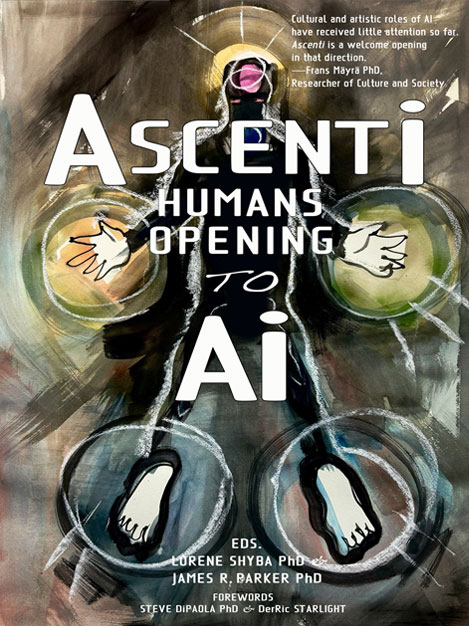Since the release of the DALL-E image-generating model in 2021 and the launch of ChatGPT in late 2022, artificial intelligence has gone from sci-fi speculation to an almost inescapable subject of debate. As new tools are developed and deployed (and hyped) at a staggering rate, AI is presented as either humanity’s saviour or an existential threat in the making.
Ascenti: Humans Opening to AI won’t settle that debate, but it isn’t intended to. Instead, as the subtitle puts it, this collection of short essays on the intersection of AI and creativity is meant as an opening, inviting a dozen Alberta artists to experiment with AI tools in their artistic practice, free from any preconceptions. Naturally, the 12 playwrights, musicians, painters, poets and other artists included here respond differently to this prompt. Some engage with AI as a creator in its own right. Others approach it conversationally, asking it for feedback and suggestions. The range of uses showcases the flexibility of these tools, and of the creative process more broadly.
The focus on experimentation encourages a conversational and reflective tone; as a glimpse into the creative practices of a multidisciplinary group of artists, Ascenti would be valuable even without the inclusion of AI. The collection’s most striking moments are often its most diarylike—as when painter Rich Théroux confesses that working with AI “feel[s] a little like the shame people harbour while experimenting with hard drugs,” or when musician Kenna Burima shares her fears of how generative tools will disrupt her creative process.
For some artists, the results of these experiments are unambiguously positive. In his foreword to the book, DerRic Starlight describes using AI to refine stories from Indigenous participants in a writing program, and finding himself amazed how “even the trainees who cannot read or write have a way to tell their stories.” AI’s role as an assistive technology is a common thread in the more positive responses, as when artist Julian Hobson uses it to generate colours his own vision can’t distinguish, sharing how it “enhance[d] my clarity in thought, perception, and connection to many things.”
Others are less enthused. Many are struck by a mediocrity that seems inherent in AI art. Poet and writer Uchechukwa Peter Umezurike finds that generated text “relies on cliches and usual tropes” and can’t “reflect and appreciate my own lived experiences as a racial minority,” while Burima bluntly states she “did not find a shortcut, an untapped well of inspiration nor a very good collaborator.” Others focus on how AI distances them from their creative process. Painter Verna Vogel finds “[u]sing word prompts to make visual images on a digital screen is utterly tedious,” while poet Rosemary Griebel laments how AI removes the pleasure “of creating a poem through memory, conscious skill, emotion and imagination”
These critiques, alongside others about AI ethics, are important to any discussion of AI art, but due to Ascenti’s format, they’re raised mostly in passing before moving on to the next experiment. Considering how ripe “AI” is for critique (the term itself may be more a marketing masterstroke than an assessment of intelligence), Ascenti’s choice to set skepticism aside may be frustrating for some readers. Still, it makes sense if you see the project as an opening gambit in a wider conversation. Closing our eyes to generative tools won’t slow down their deployment. It only makes sense to learn from the artists and creators who will be most affected by these emerging technologies. Collections such as Ascenti are an important step towards understanding what we might gain from these tools—and what we risk losing.
Peter Hemminger is a writer and editor who has worked with numerous arts festivals and organizations in Calgary.
____________________________________________
Read more in the archive “Artificial Intelligence and Politics” November 2024.


